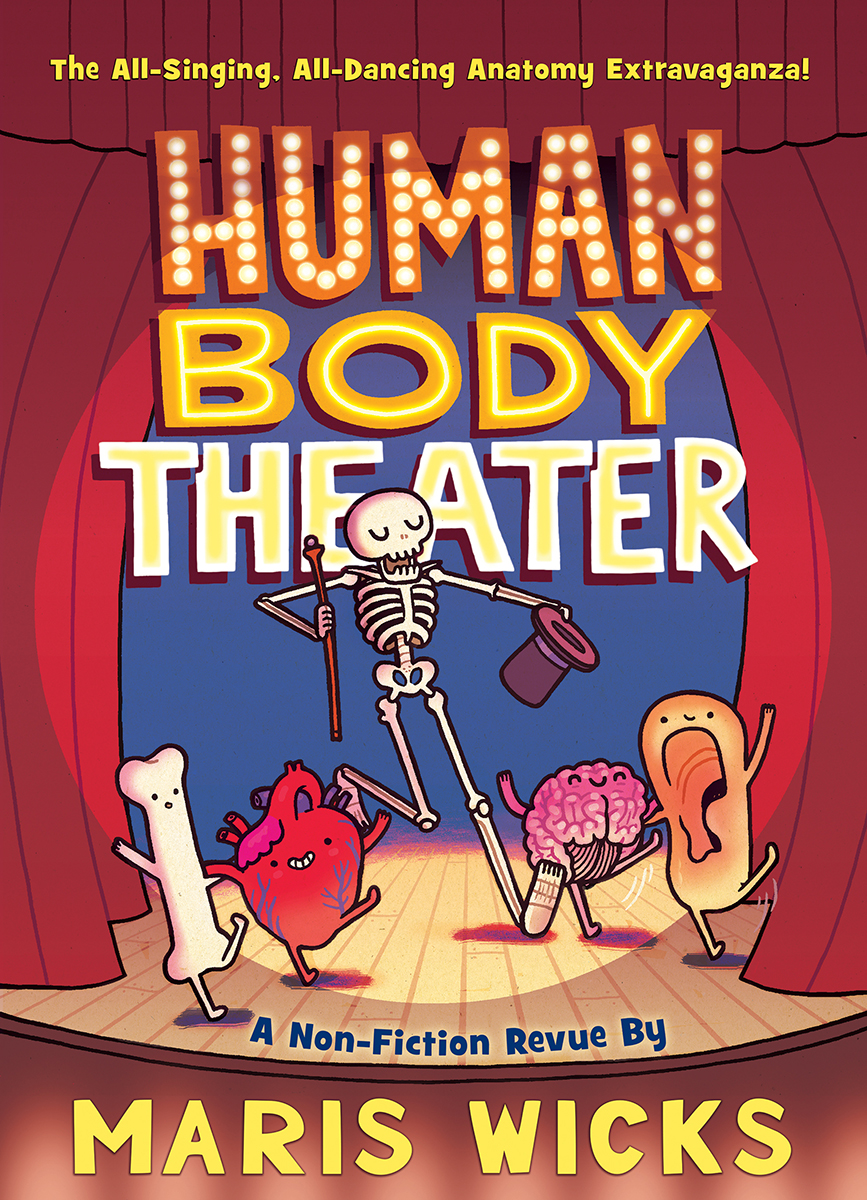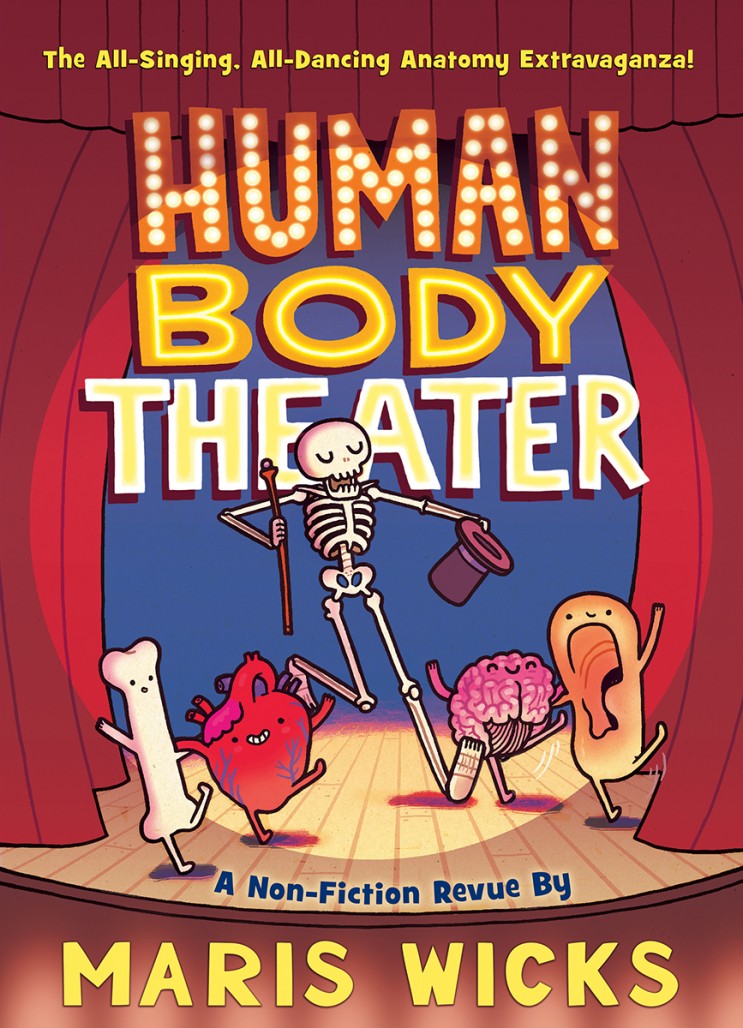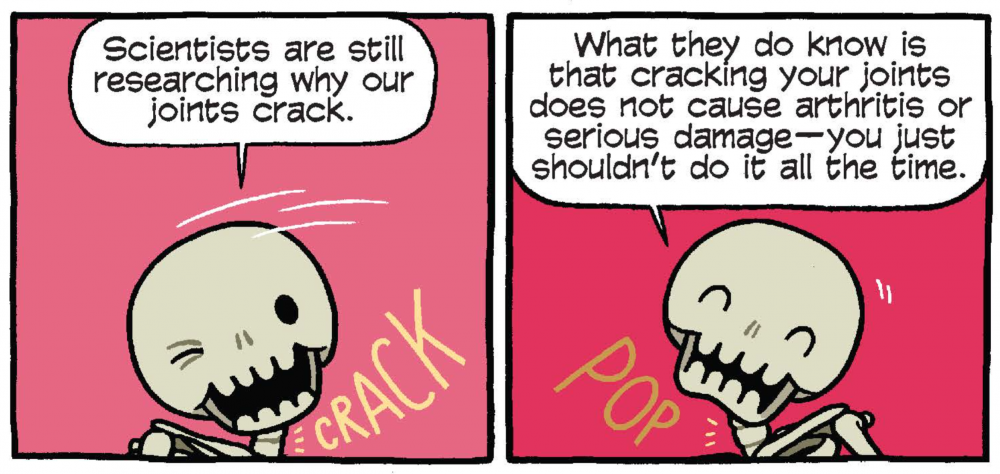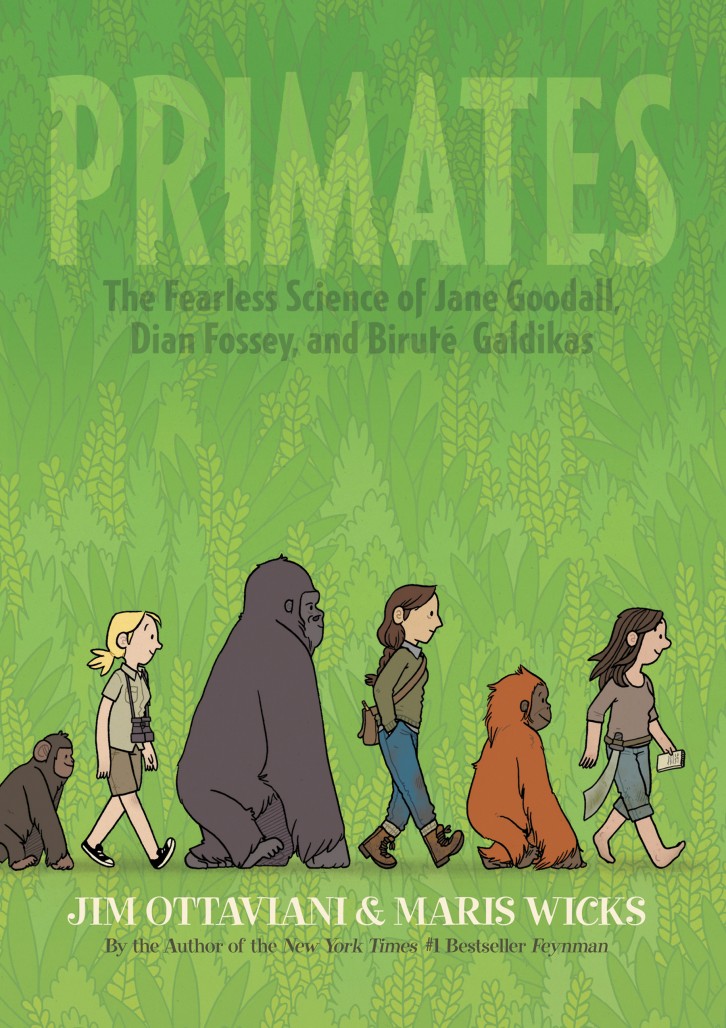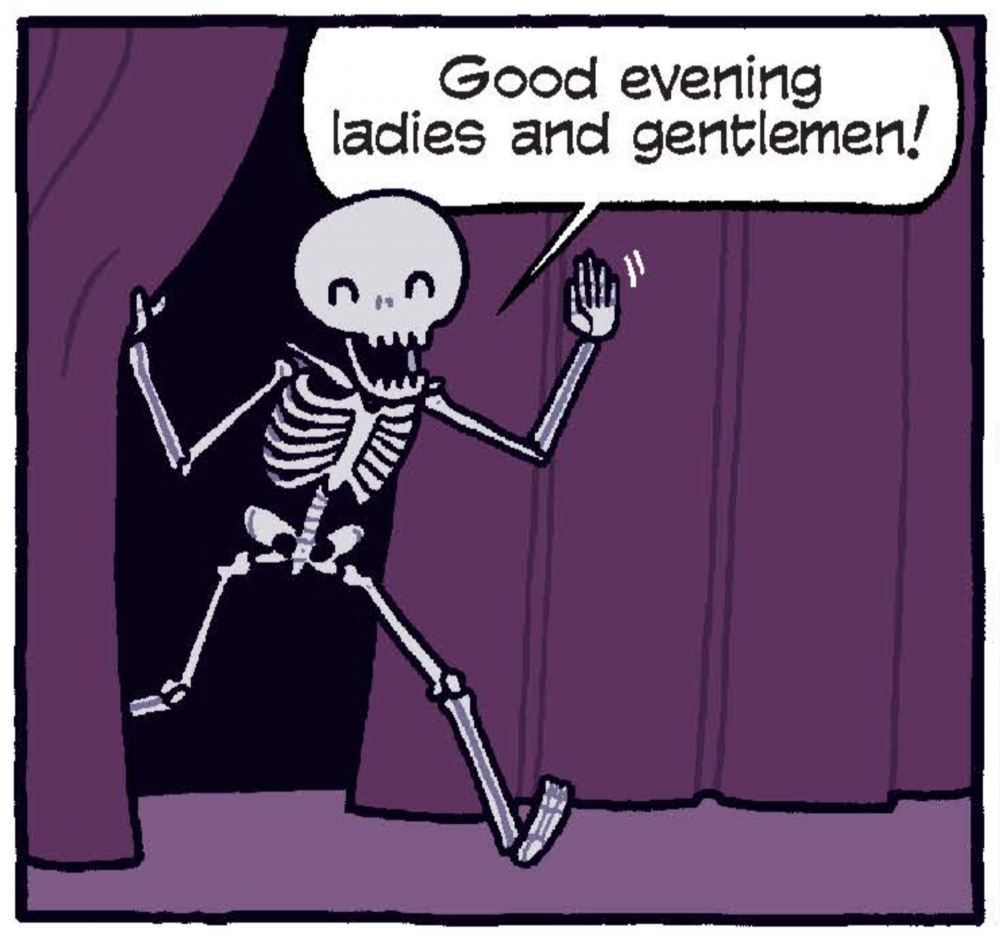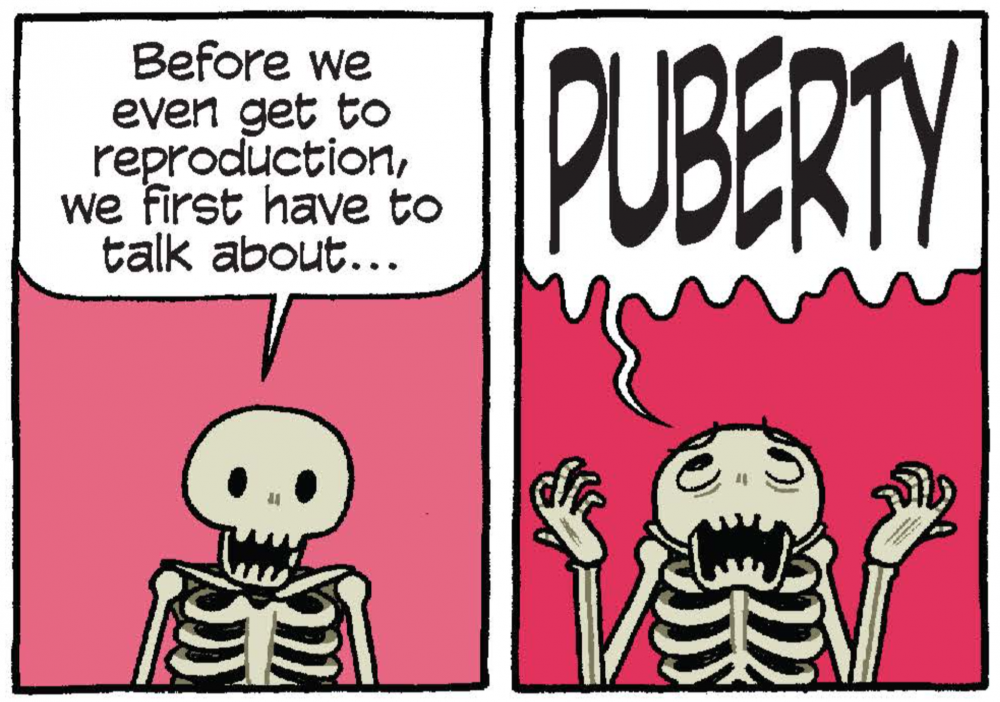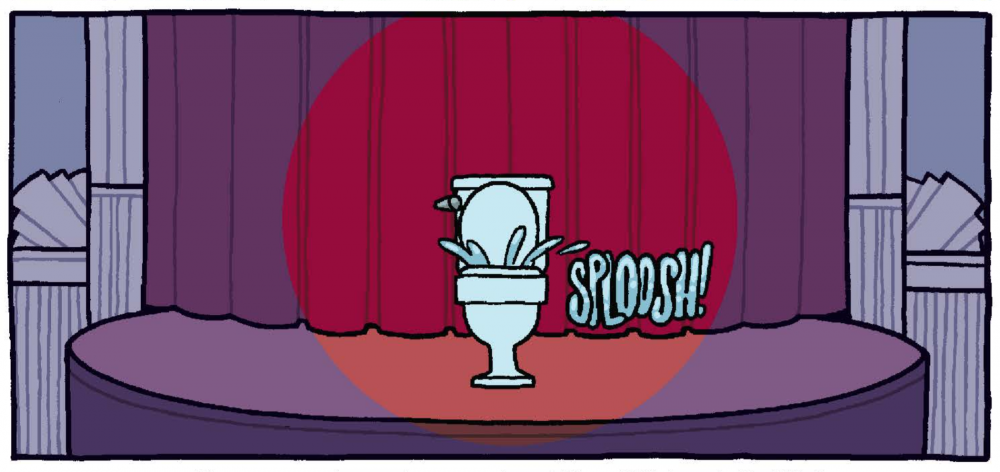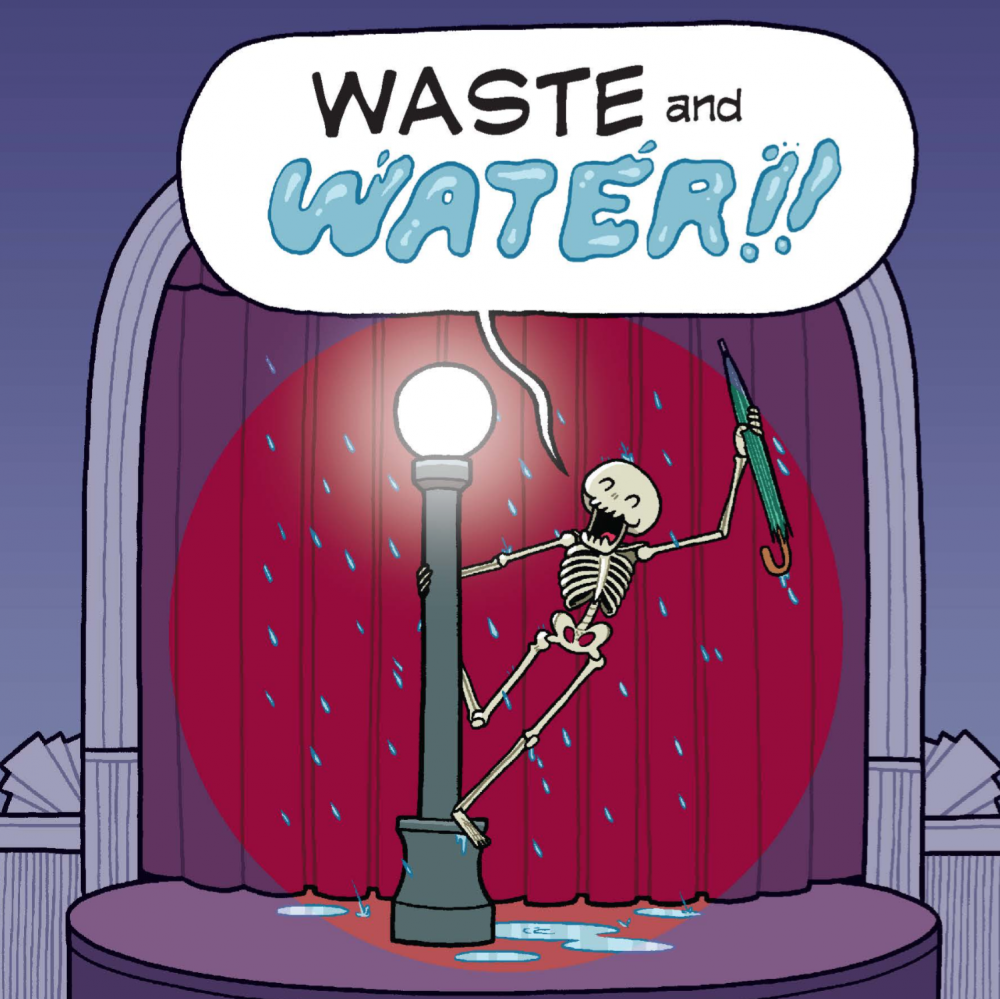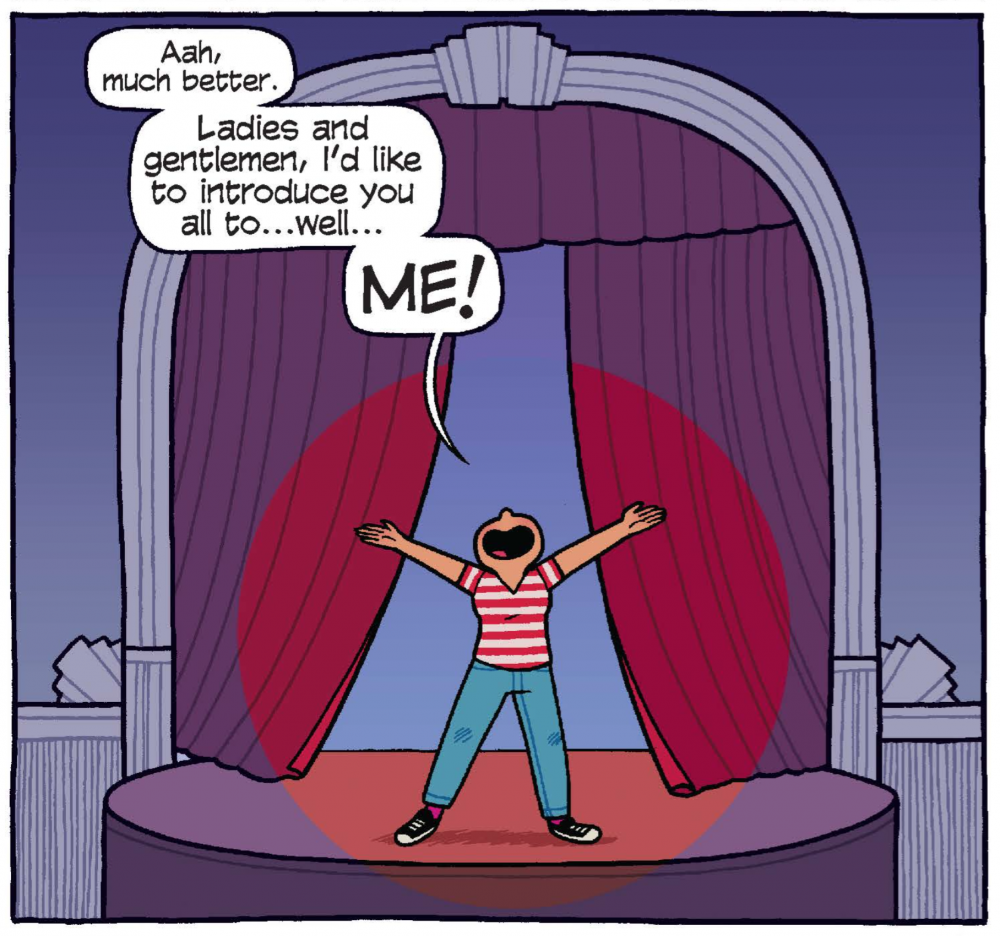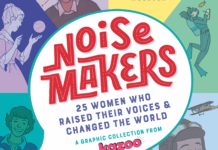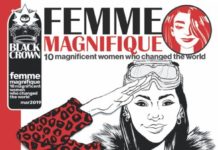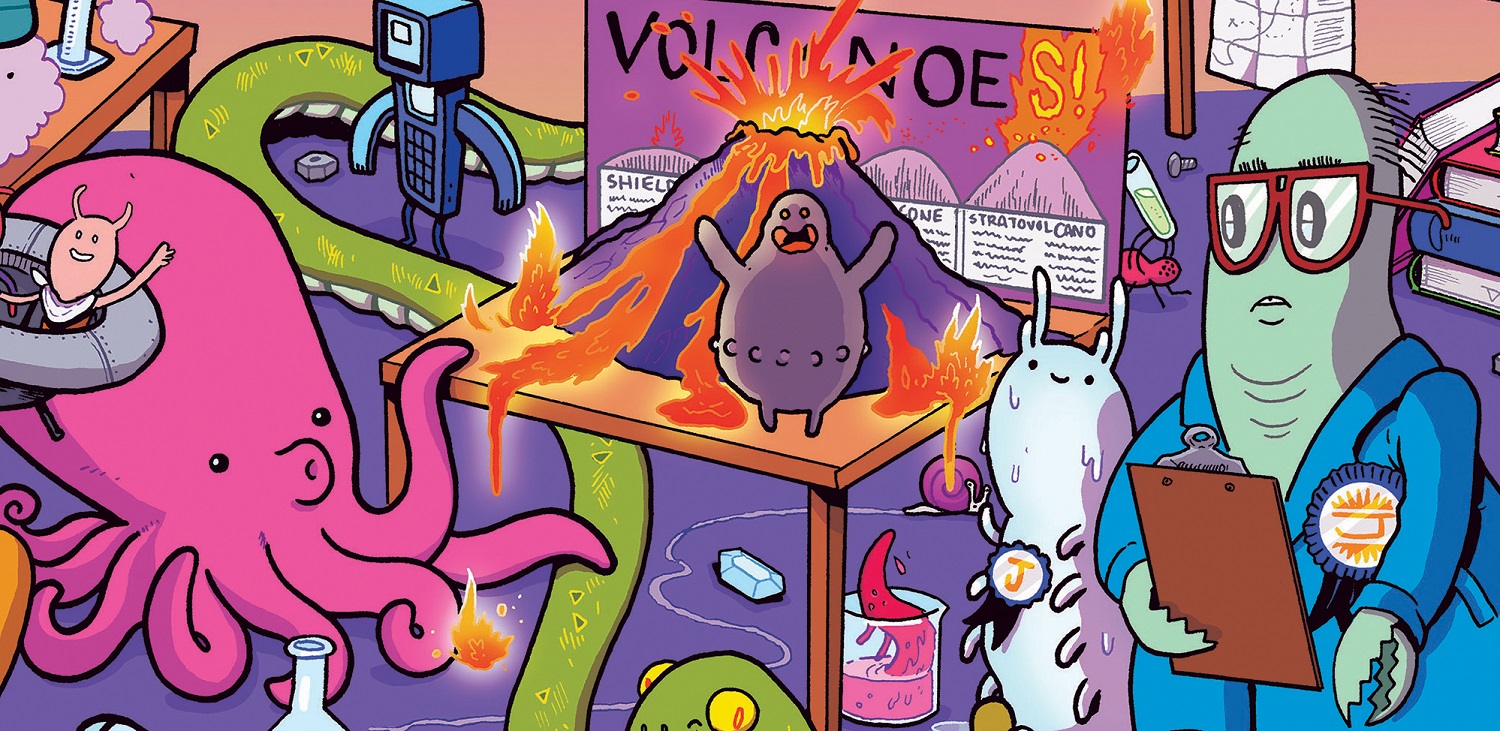by Zachary Clemente
On an almost-blustery Sunday morning the weekend before NYCC, I caught up with my pal Maris Wicks at a local coffee shop in Somerville, MA to talk about her new book from First Second Human Body Theater (out today!). We chat book vs. comics publishing, education and science, and the stressful climate in which we learn to grow. She’s worked on books such as Primates, Yes, Let’s, and Batgirl.
Maris Wicks: Hi Zach.
Comics Beat: Hello Maris, how are you?
MW: Great! How are you doing?
[Both Laugh]
CB: I’ve never interviewed a friend before.
MW: I’ll try to keep it as professional as possible unless every other word is gonna be a swear.
CB: Tht’s fine, kids don’t read The Beat.
MW: There’s a direct quote from me from an interview that I don’t remember saying that went “I thought I wanted to work on an ambulance, but then I rode around in one and as like ‘fuck that, I’m not doing this!’” They put the direct quote in the article and oops!
CB: I got a chance to read Human Body Theater and it’s a lot of fun.
MW: Oh, thank you!
CB: You’ve done a number of books in the vein of science and education, what’s the research phase for for you? How much time went into it for Human Body Theater?
MW: The only published thing I have to compare it against is Primates and I didn’t write that but while I was doing the thumbnails, there was a like a 3-inch stack of photocopies, a lot of reading and a lot of internet research. But for Human Body Theater it was a combination of accrued research previous to the book even becoming a thing and then looking at what is out there as resources that are available to kids. A lot of the books that I looked at for research were all the DK books like the Eyewitness books and a super-chunky “more for adults” human body book which is kinda grim because it focuses on the diseases and ailments. “Here’s the body and this is what goes wrong!” I didn’t put all that stuff in.
So I really liked science in high school – as a hobby, I wasn’t that great at it, I was better at art. While I was in my last year of college, I signed up to be an EMT which was my way of saying “I like human anatomy and physiology, maybe I want to do this as a job.” Turns out I didn’t want to, but it was a really awesome class and that kinda fueled a bit of the love of human body stuff like anatomy, physiology and also self-care and preventative health – stuff like that.
By an Americorps job I worked after college, we had a whole human body exhibit that was really fun. I found it my favorite part to interpret because human beings are kinda the walking exhibits for that so you can talk exactly what’s in the exhibit to kids so they can relate it to their own body. It was really helpful for a variety of age groups, like for toddlers because it helps a lot of self-identifying things that happen, so for interpretive stuff, it’s a lot of fun.
Later, I did a mini maybe seven or eight years ago for this thing called Uncle Envelope, which was like a minicomic a month for a year that you could subscribe to. The mini I did was the digestion of a peanut-butter and jelly sandwich, named Human Body Theater Presents and when I made it I realized I wanted to make a series of minis in a boxed set but it just kinda sat until I pitched it as I was wrapping Primates.
A lot of it was just looking at resources on kidshealth.org or the National Institutes of Health; I just wanted to look at what resources exist out there for kids. The other thing that I came across is that a lot of the diagrams were very stand-alone and a bit sterile so I wanted something that was more engaging, like what I had learned about museum interpretation to employ narrative and encourage physical movement or investigation and exploration in the text. Something like “go jump up and down and check your heart rate” or something like that.
CB: Or when you discuss cracking your neck or yawning, I immediately wanted to do those things when reading it.
MW: Yeah yeah yeah! Though I’m worried I’m going to make kids think about how much they breathe and freak them out.
CB: When it comes to educational work like this, even if it were in comics form, it wouldn’t necessarily be published by a comics publisher. Is this working because of First Second sort of bridging the gap between book and comics publishing?
MW: I feel like I have found a really fantastic and supportive home at First Second. In terms of content and what I want to do, they’re generally supportive – we’ve not butted heads except at points to make it stronger. There is, I think, a freedom working with them that I wouldn’t find elsewhere. I mean, I don’t really have anything to compare this to, but I think that narrative non-fiction science comics other places but First Second has been pursuing it so it’s become part of their brand. I don’t know, I think I have an awesome time making things like this with them.
CB: First Second is the first publisher I think of when I think of comics for children, especially in terms of educational. Off the top of my head, I can only really think of one recent comic which could be considered education which is Howtoons by Nick Dragotta at Image.
MW: Nick? Oh yeah, I’m on a panel with him at New York – I get to meet him! They look really fun.
So, I’ve done a little bit of children’s book publishing stuff and one of the things I encountered when I was learning about children’s book publishing is that the artist and the writer are kept very separate from each other. That seems to be tradition and I really like the collaborative stuff. Jim [Ottaviani] and I talked all the time about Primates, that book relied on us communicating to each other. Part of it’s because it’s comics, but part of it is because First Second really allows for more open communication, spitballing, and brainstorming. It’s not held back by a lot of traditions and I think that it’s really nice. Even though their books are really nicely done, there’s still a kernel of “minicomics self-published pushing the envelope” there.
CB: I think that’s were you find a lot of First Second’s success. They take interesting chances and wrap them in a wrapper that allows them find an audience in libraries and bookstores, but ideas or those “kernels” are goofy and funky and come out of scenes that you may have not normally expected.
MW: Yeah, with the science series they recently announced, their whole thing was that they wanted people who aren’t necessarily the experts writing them, they wanted people to be learning the content themselves. I’m not a coral scientist, I don’t have a degree in Marine Biology, but they have the faith in their writers and artists to do the research and write it.
CB: What kind of work have you done in children’s books before?
MW: Yeah, I did Yes, Let’s for Tanglewood Press which was fun and small. They kinda specialize in outdoorsy/nature-type stuff and that was great because I got to work with the writer – we went back and forth sharing ideas for illustrations. Galen Longstreth, the writer for it, does children’s literacy stuff and said it was kind of unheard of to have the writer talk to the artist. I learned the same in school, but I really liked it because we could bounce ideas back and forth and I feel like it can make it a stronger book, but there are some traditional ways that books get made still, but I feel like I haven’t run up against any of that with First Second in terms of that.
CB: It might depend on the kind of arts program you attended in school. The whole idea that you’re trained in illustration not only as an art form, but also a career which comes with certain ways of working. I find it interesting that First Second, which is part of Macmillian is managing to break that mold a bit.
MW: There’s definitely a lacking amount of content. For educational comics, there’s definitely really awesome ones out there like The Stuff of Life which is all about DNA and there’s one all about evolution which is fantastic, but tends to lean pretty heavily biologically or historically. But there’s not really any math comics? If there are, they’re packaged differently. There are cartooning books that have math and physics, but they do a different thing. I feel like there’s a lot more room for there to be comic books about math, science, chem, etc. Jim did a bit of this with Feynman and I feel like there’s more room for that and there’s an accessibility that comics grant it.
MW: At this point if someone who follows contemporary comics thinks about science comics, they think about First Second and to some degree, you. While you studied and worked incredibly hard at comics, it seems a bit of a means to an end in relation to everything that you’re doing? It’s the way to convey work in a very specific way. I don’t think your work would be the same without comics as it wouldn’t be the same without science.
MW: Yeah, I think about that a lot. In my past three books, I’ve basically used comics in a very “tame” way, clarity for storytelling. I can’t talk about what the next book is about, but I am really looking to push myself to use comics and to use visual images in a really dynamic and engaging way, more than I have in the past. Stuff like breaking the fourth wall. Is it fourth wall or third wall? Either way, I’m going to break some walls. I do really want to push myself to use comics to the best of my ability.
But yeah, going back to what you were saying, they can’t be one with the other because I am crazy-committed to the content and that’s what drives it. I don’t think I could do one without the other, I couldn’t make comics without the science and I couldn’t make books about science that aren’t comics.
CB: It’s kind of funny because there are likely people out there who only know you for your coloring work, especially after Batgirl.
MW: Surprise! When I decided to do Batgirl, I thought that it would be a really fun experiment for me to do because I really wanted to push myself color-wise and it actually helped immensely, I think, when I went to color Coral Reefs. I hope that if I made a new fans, I’m tricking them into learning stuff. [Laughs]
CB: You were talking editorial at First Second, do you think certain topics covered in Human Body Theater, especially the topics on reproduction would have been stymied or differently represented elsewhere?
MW: So, quick overview. The way that I work is that I outline, then flesh it out with a thicker outline, then start this weird outline/script hybrid while I do thumbnails. The reproductive system chapter went through the biggest changes only because I was really honing what audience the book was for. Since we ended up going for late-elementary school to middle school and less middle school/high school, I wanted to portray that chapter in a way where I wasn’t giving it more attention than the other systems, but also in a way that gave you as much information as possible.
I definitely didn’t meet any censorship, but we definitely talked about what would be appropriate. Actually, this is really interesting, I did an interview with the School Library Journal and the subject of how I skirt sex came up since I don’t actually talk about sex directly. I was thinking about it when I was researching and ended up talking to some of my co-workers and one of them mentioned that she was glad I did that since she’s in a same-sex relationship and won’t be getting pregnant via sexual intercourse. She thought it was nice to know that I was talking about what it takes to make a baby – it doesn’t necessarily matter how it gets there. From a scientific standpoint, that’s nice to hear but that’s also nice that it doesn’t limit. There are many kids, especially now, that aren’t born the traditional way – it doesn’t even have to be a same-sex couple. She really appreciated it that it wasn’t defined in the traditional way.
I was very careful to not leave stuff out but to present information in a way that was general as possible so that it wasn’t secluding. I was also very careful with the language I chose for the puberty bits discussing how people become attracted to one another. I didn’t want it to be “girls become attracted it boys and boys become attracted to girls”, I wanted the language to vague enough to not imply specific normative things.
CB: It a discussed the science in a general way – describing the biological and chemical functions. I think work like this will make more of an impact over time.
MW: I did an event where I got to sign a few advanced copies for mostly librarians and one of them picked it up and gets to the reproductive system stuff and goes “I don’t know” because there’s a tiny cartoony drawing of a penis. She thought long and hard, pun not intended…
[Both laugh]
CB: I’m not editing that out.
MW: Okay! Anyway, she thought about it and I went over it with her on how there’s nothing it that’s different from what’s out there now for the same age range and thankfully, at the end, she took the book. I think there are people who are see that and immediately go “no!” and I think that’s tricky – talking about social taboos. There’s a longer discussion that I had with myself and others about this book when it was getting made about body shaming and positive body image and things I think that are really important. The book doesn’t explicitly talk about those things but hopefully it gives fuel or resources for kids to feel comfortable with their bodies. It’s tricky because I didn’t want to be heavy handed but those were things that were definitely sincere concerns of mine. I feel like those get addressed when kids are teens – I think you need to start a lot younger.
CB: When I was reading, I remember my own sex ed classes back in elementary school, like in 4th or 5th grade.
MW: Yeah, same. Did they split the boys and girls up?
CB: Yeah, they did.
MW: I wish they didn’t do that. Or maybe split them up but give them both the same content.
CB: That’s what really impresses me about Human Body Theater, it’s neutral with a really careful tone. I feel like you were able to talk about a lot more without hang-ups. One of the big indicators is that you’re discussing both sexes at the same time, which isn’t something you normally see. At least, when I was growing up, it’s not an experience I got.
MW: Oh yeah, same. That type of stuff just traditionally tends to be gender-split and I think it’s a disservice to both parties to do that. I feel that would also help to make things less embarrassing – there’s the part in the book where I talk about menstruation and say “boys, you can keep reading!” Especially during puberty, there’s an immense about of social anxiety about change even though every other teenager is basically going through similar things, it’s still really hard to not feel like you’re losing control of your mind.
CB: In a sense, you kind of are! It’s hard to fully remember at this point, but I remember it being shitty.
CB: I know you may not have gotten a lot yet, but what kind of reception has Human Body Theater had in academia/education versus in comics?
MW: That’s a really interesting question. So you know the animal that is Tumblr and notes and things like that? I have tried to have presence in social media but I’ve found that since my work gets pushed so hard in the library and school sectors, they’re getting a lot of attention and people are reading, but I don’t hear it because it’s not generating a lot of notes on Tumblr; they’re completely separate ways to quantify data. I try to stay active on social media and post information but it’s hard for me because I think the people that are interested in finding out what I’m doing next are not the same people who would be checking those sites.
I definitely thank First Second an immense amount because they’re the messengers for a lot of that stuff, they do a ton of work. The fact that it takes a year after you finish a book for the book to come out; they’re spending that whole year pushing it in the right places. Not that I shouldn’t promote myself, but I think that’s really interesting to know. There’s not a lot of kids on Twitter, but when I meet people who really like my stuff at conventions, it’s really fun to see. It’s more quantifiable that way, but part of it is that the feedback is there but not there whereas for a lot of my peers rely on the internet for their audience and community. It’s not there, but I don’t mind at all; doing events like school visits or library-coordinated stuff have been a lot more fun for me than it has been to do stuff at mainstream superhero comic conventions.
I’ve done some mild school visits, like unofficial, afterschool stuff but I’m doing my first official school presentation in an actual auditorium for 175 middle schoolers on Wednesday. I’ve been giving presentation at the Boston Aquarium for the past eight years for 200 plus people so I’m not scared about it, I’m just scared about what I should say…? I’m talking about things that are potentially embarrassing, they were for me, and now I have to go talk to middle schoolers who are basically in the same shoes that I was 20 years ago.
It’s tricky. I think about the logistics of getting information out there and maybe I just haven’t figured out the internet yet and maybe never will.
CB: It kind of feels like putting the cart before the horse, but I think it’s interesting to find out where your work falls by seeing where your audience comes from? There are definitely comics readers out there who like your work because they are good comics and there are readers who don’t necessarily care that it’s a comic but really care about the content.
MW: That my ultimate scheme. Get people who don’t read comics to read comics and get people who don’t read educational work to read educational work.
CB: It sounds like it’s working.
MW: There’s been a number of people that I’ve given Primates who have never read a comic before who really enjoyed it. It’s the same type of attitude that some grownups have about not liking cartoons. It’s because they haven’t found the right cartoon; if you don’t like comic books it’s because you haven’t found the right one yet.
CB: Was there any point of the book where you felt like you were getting away with something such as the privilege of talking about poop?
MW: Oh…well, maybe can tell that the digestive system is my favorite. A lot of the voice that’s in Human Body Theater is the same voice that I use to talk to anywhere between second-graders and high-schoolers in a museum setting. I try and be really enthusiastic and a little silly and a little serious; all of that wrapped up into one. I mean, there’s lots of really stupid humor in it, it’s really really corny.
CB: It reminds me of a Brendan Graham comic in that sense – full of puns.
MW: Haha, yeah! I’m actually a little sad I didn’t put in more puns but I was worried that people wouldn’t be able to stomach the puns. Ooooooooh!
CB: Wow.
MW: The only thing I kinda regret afterwards is that it’s a little bit of a cheat to call it Human Body Theater because there aren’t as many theatrical aspects as I wanted. I wish that there was more of a theatrical element, so my hope is that some middle or elementary school will adapt it into an actual play. I would lose it if that happened, how amazing would that be?!
CB: I’d imagine it would be like someone tattooing you work on themselves.
MW: I thought maybe I should write some songs for it. I really wanted to write a song about puking and play it on the “pukeulele” so basically have an ukulele that’s painted like vomit.
CB: Oh man, that reminds me of those Grossology books that would have the fake plastic vomit.
MV: Haha, yeah! I didn’t want to go too gross-out. There are human body books out there that are super Grossology. I’m trying to think if there were any little things that I feel like I got away with by putting in and all I can think of are the parts that breaks a bit outside of the human body for some comparative anatomy stuff like showing the tiniest heart in a frog and the largest heart in a whale – but I wasn’t breaking any rules. I guess when I had the “Singing in the Rain” shout-out for the excretory system I had to chuckle to myself because it’s kinda gross. It’s not like really raning pee, but still.
But no, I don’t feel like I did anyting like that, I know I was proud that with the reproductive system chapter I got to draw little cartoon naked people. I was thinking about that because a lot of people have sent me the screencap of Louis Leakey as a really small child running around naked in Africa going “you drew the tiniest penis in this book!” Maybe I need to make sure that every book I do has a tiny penis.
CB: Did you fear or think that Human Body Theatre is going to end up on a banned book list?
MW: I can only hope because that would be great press, wouldn’t it? I think a lot of the times when that happens, it only lifts up the work. People want to know why it’s challenged.
CB: It’s like a vote of confidence or an exclusive club at this point.
MV: I thought about that because when I went to find other books about the human body, two of the books that I grew up with, Where Did I Come From? and What’s Happening to Me? about babies and puberty are super challenged! I didn’t even think that they would be, but I guess this is a testament to how I was raised and how other are raised. I didn’t think it would be taboo to talk about masturbation in a book, but it totally is! Because of the books I was provided as a kid, I didn’t have shame over learning about that stuff. I think I’m lucky to have that upbringing, but I definitely understand that it’s a taboo and a challenged thing.
Part of me doesn’t want Human Body Theater to be banned because I really tried to do a good job of making it super accessible and appropriate for the age range that it’s for but without censoring what needs to be in there. I think part of this goes back culturally to body image and shame and too a larger degree, consent and all this stuff around big questions that happen later usually when you’re a teenager, but there’s no reason why you can’t start to build a more positive and healthy relationship with your body at an earlier age. That’s what I wanted to exist because there are plenty of books aimed just a puberty and there are lots of books that are a textbook for what your body is like, but there’s nothing really in between those two that’s as casual that talks to the reader. I really wanted to balance that language because a lot of the ones for teens or pre-teens do have a fairly casual and humorous tone but limited to that scope.
I guess a lot of it for is is that I’m not making any new content; I’m taking content that already exists and re-packaging it. It’s the tone and the way it’s presented – there isn’t anything out there like this. That’s what I wanted to do, another new level of engagement to get readers. Not just because I think it’s important medically, but I think as a whole human thing. That’s the other thing, I feel that way, but I don’t want to force people talk to their kids about their bodies. I think it’s so important, but yeah I thought about political/social stuff like this a lot. Even though, again, it’s really not in the book as much. The kernel I kinda took from it is that part of the transitions of raising kids is the transition from caring for your children to teaching them to care for themselves and that’s part of what we do as humans. We already know that that has to happen, how can I provide parents with the resources to make that an easier process? Help them have the information and not just kids and that’s where I feel okay – this being a resource for both parties.
If you know more about your body, there’s a responsibility there but also an empowerment to take care of yourself. For kids, I feel like that’s really important. It’s not obvious by reading the book, but these are the things I really thought hard about when it was getting made and after it’s coming out.
CB: Corals is coming out soon and if I remember correctly, you’re taking a trip for that?
MW: Actually, a year ago I took a research trip for Corals and kind of as a treat to myself, Im taking the same trip but not doing any research although I will be guest blogging for the Aquarium. I’ll be making a comic about the trip uploaded to the Aquarium’s website in November/December.
CB: Super cool.
MW: Yeah, thanks Zach!
CB: My pleasure, buddy.
Maris Wicks is a cartoonist living in Somerville, MA. She making wonderful science and educational comics at publisher First Second. You can find her work where books are sold and follow her for updates on her Tumblr or Twitter.
Human Body Theater comes out TODAY and Coral Reefs comes out May 8th, 2016 both from First Second


